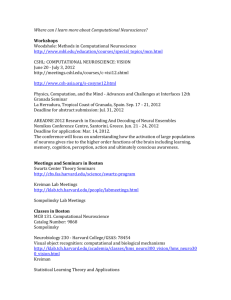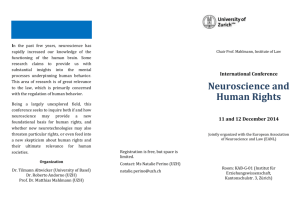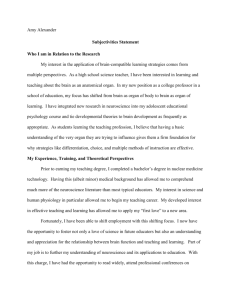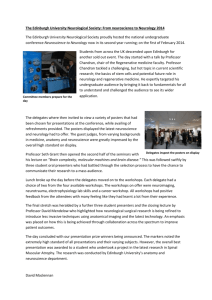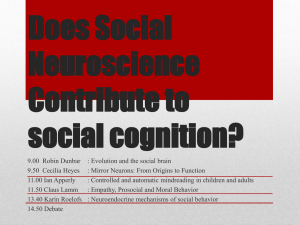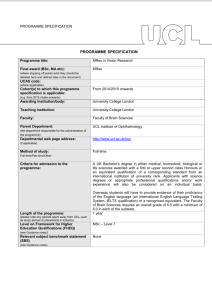MRes Brain Sciences - University College London
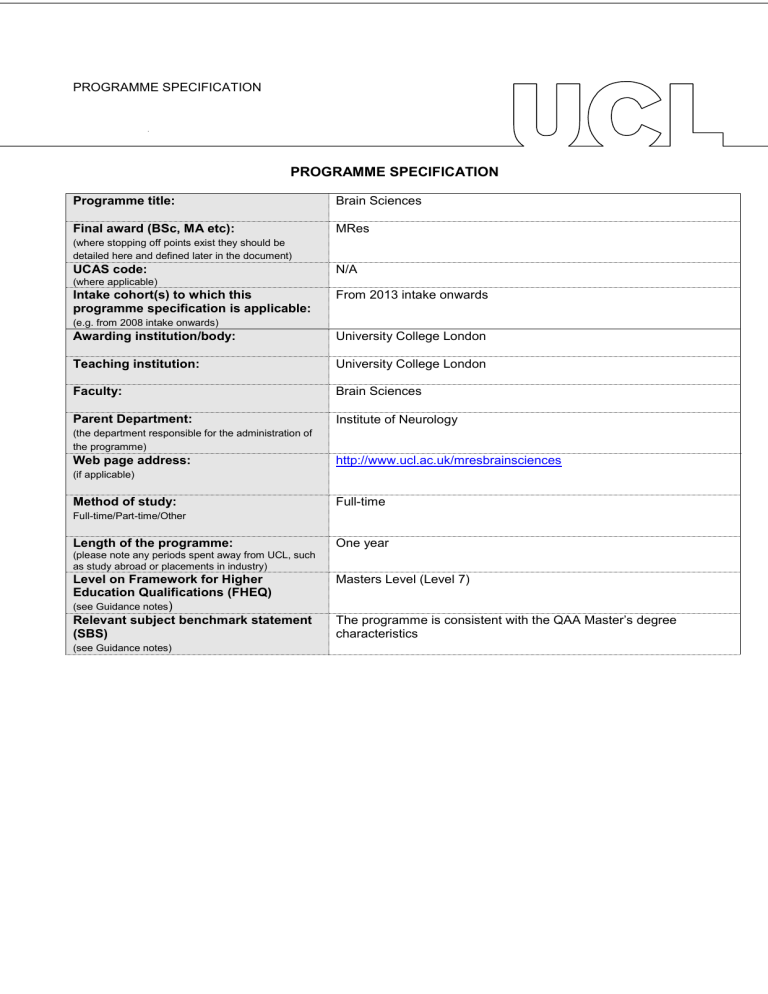
Документ1
PROGRAMME SPECIFICATION
Programme title:
Final award (BSc, MA etc):
(where stopping off points exist they should be
PROGRAMME SPECIFICATION
Brain Sciences
MRes detailed here and defined later in the document)
UCAS code:
(where applicable)
Intake cohort(s) to which this programme specification is applicable:
(e.g. from 2008 intake onwards)
Awarding institution/body:
Teaching institution:
Faculty:
Parent Department:
(the department responsible for the administration of the programme)
Web page address:
(if applicable)
Method of study:
Full-time/Part-time/Other
Length of the programme:
(please note any periods spent away from UCL, such as study abroad or placements in industry)
Level on Framework for Higher
Education Qualifications (FHEQ)
(see Guidance notes )
Relevant subject benchmark statement
(SBS)
(see Guidance notes)
N/A
From 2013 intake onwards
University College London
University College London
Brain Sciences
Institute of Neurology http://www.ucl.ac.uk/mresbrainsciences
Full-time
One year
Masters Level (Level 7)
The programme is consistent with the QAA Master’s degree characteristics
Документ1
Brief outline of the structure of the programme / its assessment:
(see guidance notes)
The programme consists of four taught modules (15 UCL credits each) and an extensive empirical research project (120 UCL credits).
Two of the taught modules are key skills modules. The first of these
(Research Methods I: Research Methods and Statistics) will provide training in statistical methods in neuroscience research. The second
(Research Methods II: Biosciences Research Skills) will provide training in the development of personal and professional skills necessary for contemporary neuroscience research and set against the Researcher Development Framework, including skills in engagement, communication and dissemination, professional conduct, research management, self-management, and knowledgebased skills. The remaining two modules are core teaching modules.
Students will select one of a list of options for the first core teaching module. This module will provide fundamental knowledge in neuroscience but also offer students with an existing background in neuroscience the opportunity to expand their knowledge of topics in the field. The second core teaching module will be research-led and give students knowledge and insight into the broad and interdisciplinary scope of neuroscience through exposure to contemporary topics in brain sciences research. The assessment of the modules is described below.
Key Skills Modules:
Research Methods I: Research Methods and Statistics (EARIGA01)
(15 credits)
Assessment: Weekly online task
AND
Research Methods II: Biosciences Research Skills (BIOSG002) (15 credits)
Assessment: Poster design, figure design, project abstract, project protocol
Core Teaching Modules:
One of the following (15 credits):
CLNEG021 Cellular and Molecular Mechanisms of Disease
PALSG01 Introduction to the Brain and Imaging the Brain
PSYCGC13 Theories and Paradigms in Cognitive Neuroscience
PSYCGC14 Structure and Measurement of the Human Brain
PSYCGD01 Introduction to Cognitive Science
PSYCGD02 Principles of Cognition
PHARG003 Molecular Pharmacology
ANATG002 Developmental Neurobiology
ANATG008 Receptors and Synaptic Signalling
CLNEG048 Experimental Neurology
Assessment: Includes unseen written examinations, essays and practicals
AND
Contemporary Topics in Brain Sciences Research (15 credits)
Assessment: Weekly online task, 2,000-3,000 word written essay, oral presentation
The empirical research project involves independent research in any area of neuroscience, under the primary supervision of a UCL expert.
Where possible, dual supervision by UCL experts across the Faculty of Brain Sciences collaborating on interdisciplinary projects will be facilitated. The project assessment will be a primary manuscript in a journal style relevant to the research project discipline, a literature review and oral presentation.
Документ1
Board of Examiners: Name of Board of Examiners:
Brain Sciences Board of Examiners ii) Name of External Examiner with overview of entire programme:
TBC
N/A Date of next scheduled accreditation visit:
Professional body accreditation
(if applicable):
EDUCATIONAL AIMS OF THE PROGRAMME:
The aim of the programme is to teach the core theoretical, practical and current state of knowledge in the field of neuroscience. The overarching aim of the programme is to develop critical awareness of the multi- and interdisciplinary nature of neuroscience through exposure to cutting-edge research in neuroscience topics spanning across the Faculty of Brain Sciences. The programme develops key research skills that are supported by professional core skills in the effective management, implementation and dissemination of research. The programme is therefore a platform for research careers either in academia through further PhD study or in industry or business. Core skills in personal and professional development will also prepare students for more general careers. The programme is ideal for highly-motivated students that are interested in the breadth of neuroscience and that are seeking a programme that will facilitate creative and critical thinking in new advances and applied research in the field of neuroscience.
PROGRAMME OUTCOMES:
The programme provides opportunities for students to develop and demonstrate knowledge and understanding, qualities, skills and other attributes in the following areas:
A: Knowledge and understanding
Knowledge and understanding of:
The core principles of neuroscience and more advanced topics in neuroscience
(neuroanatomy, developmental neurobiology; the physiology and function of the nervous system,
Teaching/learning methods and strategies:
Lectures, seminars, independent study, journal clubs, independent and collaborative problem-based tasks, practical demonstrations and classes, supervised empirical research project. neuropharmacology, diseases of the nervous system, human brain anatomy; measurement and visualisation of the human brain; brain imaging technologies; fundamental cognitive processes; computational models of cognition; fundamental principles of psychoanalytic theory); research-informed advances and new insights in neuroscience; statistical and neuroscience methods; experimental design and techniques applied at the forefront of neuroscience research, research governance and organisation.
Документ1
Assessment:
Online tasks, unseen written examinations, essays, oral presentations, practicals, primary research article.
Intellectual (thinking) skills:
Read, understand, evaluate and report on journal articles.
B: Skills and other attributes
Teaching/learning methods and strategies:
Lectures, seminars, independent study, journal clubs, independent and collaborative problem-based tasks, practical demonstrations and classes, supervised empirical research project.
Evaluate methodologies and develop critiques of them. Evaluate how different methodologies, measures and approaches have advanced knowledge in fundamental neuroscience.
Critically evaluate current research and advanced scholarship in neuroscience.
Propose an experimental hypothesis, design experiments and choose an appropriate measure for an experimental question. Effectively manage the planning and delivery of the research project.
Assessment:
Online tasks, unseen written examinations, essays, oral presentations, practicals, primary research article.
Документ1
Practical skills (able to):
Apply established and new techniques and methods of neuroscience research and enquiry, and understand their use and interpretation in neuroscience research. Design and implement experimental plan for research project.
Access and utilize appropriate resources in order to effectively find and manage information and reference material.
Manage and analyse data, include statistical data, and prepare data for publication.
Use a range of software packages to effectively and professionally communicate science through verbal, written and visual means.
C: Skills and other attributes
Teaching/learning methods and strategies:
Supervised practical experimentation; computational methods in statistics; computational literacy in tools used for accessing information resources; computational literacy in programmes used for the interpretation, preparation and presentation of research data.
Assessment:
Online tasks, essays, oral presentations, practicals, poster design and primary data presentation figure design, project abstract and protocol, primary research article.
Transferable skills (able to):
Deal with complex issues systematically and creatively.
Exercise initiative and make sound judgements.
Engage and communicate effectively with others to disseminate knowledge.
Demonstrate self-direction, autonomy, originality and the capacity for critical independent thought in planning and implementing tasks, and solving
D: Skills and other attributes
Teaching/learning methods and strategies:
Lectures, seminars, independent study, journal clubs, independent and collaborative problem-based tasks, practical demonstrations and classes, computational work, supervised empirical research project. problems.
Manage projects.
Документ1
Assessment:
Online tasks, unseen written examinations, essays, oral presentations, practicals, primary research article.
The following reference points were used in designing the programme:
the Framework for Higher Education Qualifications:
( http://www.qaa.ac.uk/en/Publications/Documents/Framework-Higher-Education-Qualifications-08.pdf
);
the relevant Subject Benchmark Statements:
( http://www.qaa.ac.uk/assuring-standards-and-quality/the-quality-code/subject-benchmark-statements );
the programme specifications for UCL degree programmes in relevant subjects (where applicable);
UCL teaching and learning policies;
staff research.
Please note: This specification provides a concise summary of the main features of the programme and the learning outcomes that a typical student might reasonably be expected to achieve and demonstrate if he/she takes full advantage of the learning opportunities that are provided. More detailed information on the learning outcomes, content and teaching, learning and assessment methods of each course unit/module can be found in the departmental course handbook. The accuracy of the information contained in this document is reviewed by UCL and may be checked by the Quality Assurance Agency for Higher Education.
Programme Organiser(s)
Name(s):
Dr Jacqueline van der Spuy
Dr Andrew McQuillin
11 th November 2014 Date of production/revision:
Date approved by Head of
Department:
November 2014
Date approved by Chair of
Departmental Teaching
Committee:
November 2014
November 2014 Date approved by Faculty
Teaching Committee

